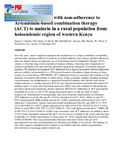Factors associated with non-adherence to Artemisinin-based combination therapy (ACT) to malaria in a rural population from holoendemic region of western Kenya

View/
Date
2012Author
Ouma, C
Orinda, GO
Gumo, S
Okoth, JM,
Raballah, E,
Anyona, SB
Okumu, W,
Were, T,
Watsierah, CA,
Ayodo, G
Onyango, EO,
Type
ArticleLanguage
enMetadata
Show full item recordAbstract
Over the years, reports implicate improper anti-malarial use as a major contributor of morbidity and mortality amongst millions of residents in malaria endemic areas, Kenya included. However, there are limited reports on improper use of Artemisinin-based Combination Therapy (ACT) which is a first-line drug in the treatment of malaria in Kenya. Knowing this is important for ensured sustainable cure rates and also protection against the emergence of resistant malarial parasites. We therefore investigated ACT adherence level, factors associated with non-adherence and accessibility in households (n = 297) in rural location of Southeast Alego location in Siaya County in western Kenya.
METHODS:
ACT Adherence level was assessed with reference to the duration of treatment and number of tablets taken. Using systematic random sampling technique, a questionnaire was administered to a particular household member who had the most recent malaria episode (<2 weeks) and used ACT for cure. Parents/caretakers provided information for children aged <13 years. Key Informant Interviews (KIIs) were also conducted with healthcare providers and private dispensing chemist operators.
RESULTS:
Adherence to ACT prescription remained low at 42.1% and 57.9% among individuals above 13 and less than 13 years, respectively. Stratification by demographic and socio-economic characteristics in relation to ACT adherence revealed that age (P = 0.011), education level (P < 0.01), ability to read (P < 0.01) and household (HH) monthly income (P = 0.002) significantly affected the level of ACT adherence. Consistently, logistic regression model demonstrated that low age (OR, 0.571, 95% CI, 0.360-0.905; P = 0.017), higher education level (OR, 0.074; 95% CI 0.017-0.322; P < 0.01), ability to read (OR, 0.285, 95% CI, 0.167-0.486; P < 0.01) and higher income (Ksh. > 9000; OR, 0.340; 95% CI, 0.167-0.694; P = 0.003) were associated with ACT adherence. In addition, about 52.9% of the respondents reported that ACT was not always available at the source and that drug availability (P = 0.020) and distance to drug source (P < 0.01) significantly affected accessibility.
CONCLUSIONS:
This study demonstrates that more than half of those who get ACT prescription do not take recommended dose and that accessibility is of concern. The findings of this study suggest a potential need to improve accessibility and also initiate programmatic interventions to encourage patient-centred care
URI
http://erepository.uonbi.ac.ke:8080/xmlui/handle/123456789/32744http://www.ncbi.nlm.nih.gov/pubmed/22726955
http://www.ncbi.nlm.nih.gov/pmc/articles/PMC3482576/
Citation
BMC Infect Dis. 2012 Jun 24;12:143. doi: 10.1186/1471-2334-12-143Publisher
Department of Biomedical Sciences and Technology, Maseno University, Maseno, Kenya
Collections
- Faculty of Health Sciences (FHS) [10378]
